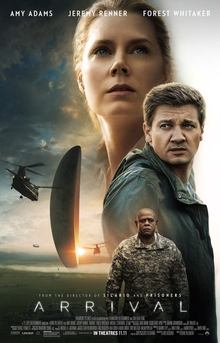Arrival: Can time change our problem with pain?
A film in which a linguist is recruited by the military to assist in translating alien communications changes how we see time. Might we find some answers to the age old problem of pain? By Tom Cozens
Non-spoiler alert: This article has been carefully written to explore themes in the film without giving away the plot twists. Pre-publication testing has shown that it enhances rather than spoils the enjoyment of viewers. Nevertheless, you may decide to read it after, rather than before, seeing the film.
 What would it be like to sit outside the restrictions of a linear time-line? What if we could make decisions with a full knowledge of the consequences? If you knew your child would experience suffering, would you still bring him/her into the world? Arrival explores these big themes of time, transcendence and suffering through the eyes of the linguist Louise Banks (Amy Adams) as she makes first contact with an alien race.
What would it be like to sit outside the restrictions of a linear time-line? What if we could make decisions with a full knowledge of the consequences? If you knew your child would experience suffering, would you still bring him/her into the world? Arrival explores these big themes of time, transcendence and suffering through the eyes of the linguist Louise Banks (Amy Adams) as she makes first contact with an alien race.
The opening five minutes are beautifully slow. No explosions or alien battle scenes, just a well-crafted montage of emotions taking you through Louise’s grief at losing her child. This refreshingly contemplative pace immediately sets a precedent for the rest of the film. As a linguist, it is up to Louise to decipher the language of the alien visitors. This arduous process is, in a way, a metaphor for the difficulties Louise encounters when trying to express her grief.
But as the film develops, it becomes clear that this alien race offers more than just contact. Louise is thrown into a world where time is no longer linear, but a complex web of moments and narratives, each defined by key decisions in Louise’s life. Whilst Louise has a chance to save humanity, she could also change aspects of her personal story. Reminiscent of Christopher Nolan’s films, Arrival uses Louise’s story to force the viewer into releasing their assumptions about the nature of time. By 90 minutes in, I’d been stripped of my hope for a simple timeline, and had to start seeing the story as Louise did: a set of loops where concepts of past and future lose their meaning.
Using this time tool, the film raises a crucial question: would you bring a child into the world if you knew he/she would suffer and die? Ironically this is not so far from the reality in many lives today. Advances in medical technology allow us to make decisions pre-birth about our children’s lives, based upon illnesses or disabilities that they may develop. Sally Phillips recently spoke out on this topic in her BBC documentary A World Without Down’s Syndrome? Apparently ‘90 per cent of people in the UK who know their child will be born with Down’s syndrome have an abortion.’
Arrival provides a perspective on this startling figure by asking the viewer if we consider life to be worthwhile even if it is painful and limited.
Perhaps the dilemma around life and suffering highlights a decision that every prospective parent must face? We have both the foresight to see that life, for all of us, is inevitably painful and limited; and we have the power to choose to bring children into the world – or not.
The philosopher Vince Vitale points out that, as parents, we knowingly bring children into a world in which they will experience suffering, and that we believe this to be a morally good decision. Vince goes on to argue that this is the same decision a Creator God would have to make when giving life to each of us.
By changing how we see time, Arrival gives us a glimpse of God’s perspective and causes us to consider whether we believe that, on balance, creating life is good even in the expectation of suffering. Perhaps by exploring that question through the new film Arrival, we might find some answers to the age-old problem of pain?
Picture: By Source, Fair use, https://en.wikipedia.org/w/index.php?curid=51343430
Tom is a TV producer/presenter and a member of the team at EthosEducation.org which publishes free educational resources to help people develop a greater understanding of themselves, their community and the world around them, and to explore the Bible’s teaching about contemporary issues.
This article was first published on the Ethos Film Blog (EthosFilmBlog.org) and is used with permission

Baptist Times, 24/11/2016